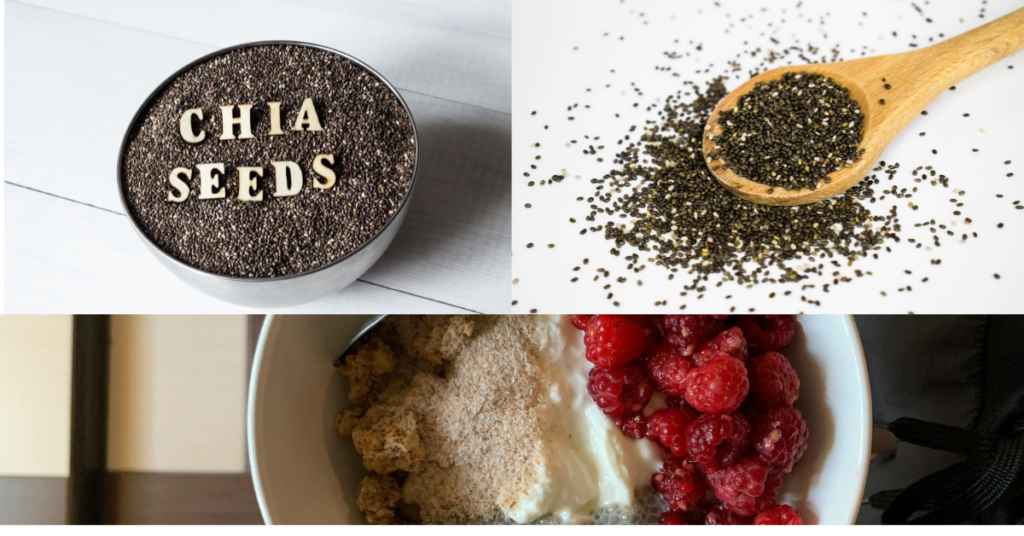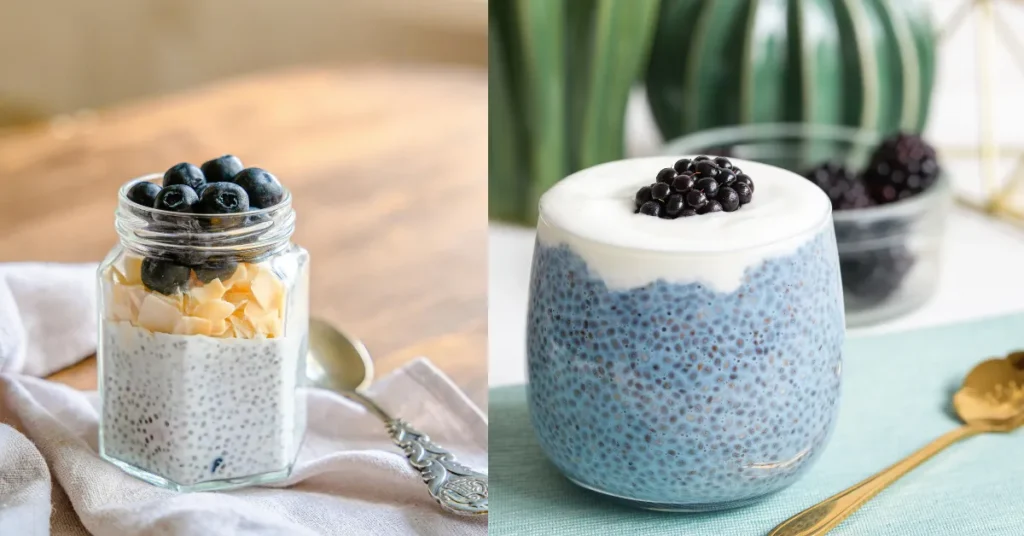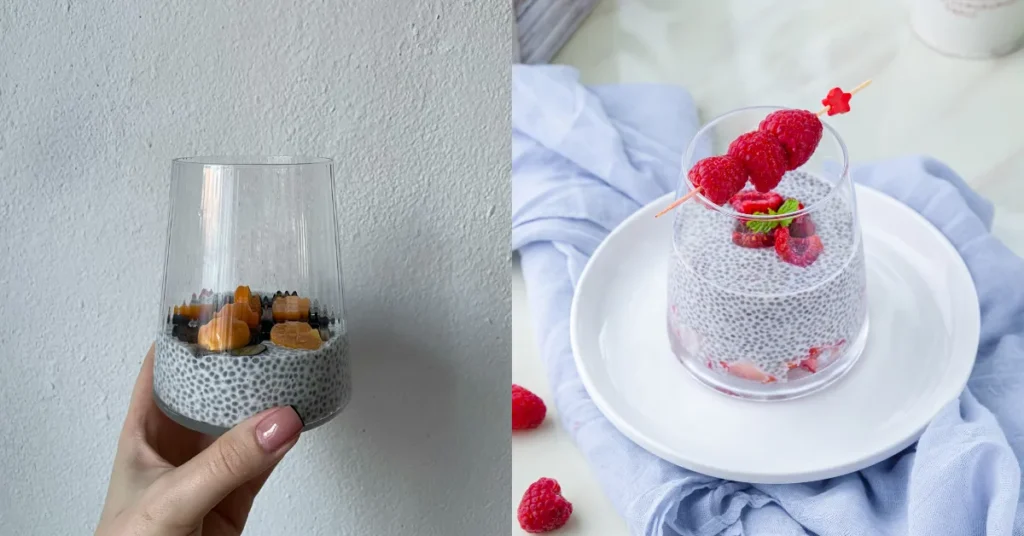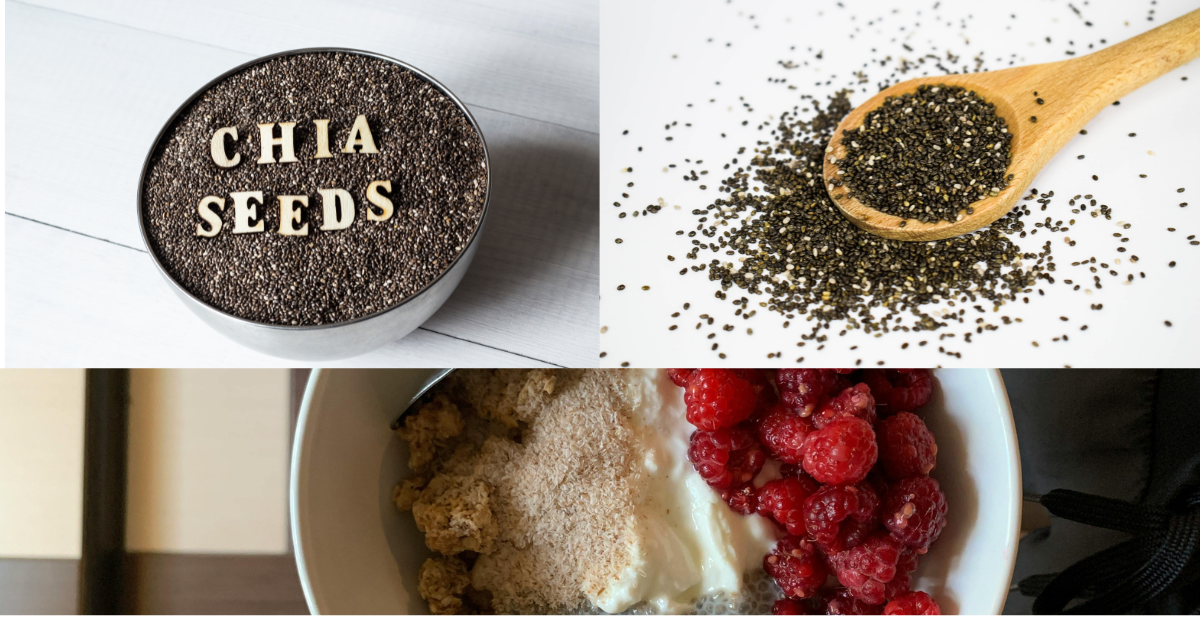8 Benefits of chia seeds for women
8 Benefits of chia seeds for women. Pregnancy is a transformative and highly anticipated period in a woman’s life. As expectant mothers, we find ourselves navigating a world filled with changes, choices, and a deep desire to provide the best possible nutrition for our growing babies. Amid this journey, there are certain ingredients that stand out, and one of these is the chia seed. In this blog, we embark on a comprehensive exploration of chia seeds, uncovering their myriad benefits, potential risks, and innovative methods for incorporating them into our diets during this pivotal stage of life.
Our aim is to delve into the nutritional marvels and considerations surrounding chia seeds, empowering expecting mothers with knowledge and options as they embark on this extraordinary adventure of pregnancy. So, let’s dive on this insightful journey and discover how chia seeds can play a valuable role in nurturing both mother and child.
Chia seeds may be tiny, but they pack an incredible nutritional punch that can significantly benefit women’s health throughout all stages of life. These small black or white seeds, derived from the Salvia hispanica plant, have been nourishing humans for over 5,000 years, serving as a staple food for ancient civilizations like the Aztecs and Mayans. Today, modern science is catching up to what these ancient cultures knew all along—chia seeds are a true superfood.

What are chia seeds?
Chia seeds are shiny, smooth, grey/black seeds that measure only a few millimeters.
It’s estimated that chia seeds have been used by humans for food, folk medicines and canvases for around 5500 years, starting with the Aztec and Mayan people.1
They come from the Salvia hispanica plant, which is part of the mint family and can be found in Central and South America.
In the Mayan language, ‘chia’ means ‘strength’, so it comes as no surprise that they were a fan of these little seeds. It’s believed that they made up one of the basic four food groups of Central American civilisations.
Fast-forward to now, and they’ve obtained ‘superfood’ status and a lot of love in nutrition worldwide – for good reason!
Chia seeds nutrition information
Two heaped tablespoons (about 28g) contains approximately2:
| Energy | Fat | Saturated Fat | Carbs | Fibre | Protein |
|---|---|---|---|---|---|
| 137kcal | 8.6g | 0.9g | 2.2g | 10g | 4.6g |
And it doesn’t stop there. Chia seeds also contain the following micronutrients with approximate RDI (recommended daily intakes):
| Nutrients | Amount | % of RDI |
|---|---|---|
| Phosphorus | 265mg | 27% |
| Calcium | 177mg | 185% |
| Magnesium | 94mg | 30% |
| Copper | 0.1mg | 3% |
| Manganese | 0.6mg | 30% |
| Thiamine | 0.2mg | 20% |
| Selenium | 15.5μg | 20% |
| Iron | 2.2mg | 15% |
| Zinc | 1mg | 7% |
| Alpha Lipoic Acid (ALA) | 5g | – |
| Omega 3 Fatty Acids | 4915mg | – |
| Omega 6 Fatty Acids | 1620mg | – |
Nutritional Powerhouse: What Makes Chia Seeds Special
Chia seeds are nutritional heavyweights that contain an impressive array of essential nutrients. Just one ounce (about 2-3 tablespoons) of chia seeds provides approximately 9.8 grams of dietary fiber, high-quality protein with all nine essential amino acids, omega-3 fatty acids, antioxidants, calcium, magnesium, phosphorus, and iron Harvard Health.

Top Benefits of Chia Seeds for Women
1. Hormonal Balance and Reproductive Health
One of the most significant benefits of chia seeds for women lies in their ability to support hormonal balance and reproductive health. These tiny seeds are rich in omega-3 fatty acids, particularly alpha-linolenic acid (ALA), which plays a crucial role in hormone regulation.
The micronutrients in chia seeds can help balance the natural rise and fall of female hormones estrogen and progesterone. For women trying to conceive, chia seeds provide essential minerals like magnesium, calcium, zinc, and iron that are vital for building red blood cells, supporting endometrial lining thickness, and improving overall reproductive health Conceive Health.
2. Pregnancy and Prenatal Nutrition
Chia seeds are considered safe and highly beneficial during pregnancy. They provide essential nutrients that support both maternal health and fetal development:
- Omega-3 fatty acids for brain development
- Calcium for bone formation (chia seeds contain more calcium per serving than many dairy products)
- Iron to prevent anemia
- Fiber to combat pregnancy constipation
- Protein for tissue growth and repair
Research shows that omega-3 essential fatty acids play a critical role in regulating hormones, increasing blood flow to the uterus, and reducing sensitivity to prolactin, which can interfere with conception Medical News Today.
3. Heart Health Protection
Women face unique cardiovascular risks, especially after menopause when estrogen levels decline. Chia seeds offer powerful heart-protective benefits:
- Cholesterol management: The fiber in chia seeds helps lower LDL (“bad”) cholesterol while boosting HDL (“good”) cholesterol
- Blood pressure regulation: Studies show chia seed consumption can help reduce both systolic and diastolic blood pressure
- Inflammation reduction: Anti-inflammatory properties help protect against cardiovascular disease
Recent research indicates that adding chia seeds to your diet could help lower cholesterol and reduce the risk of cardiovascular disease Women’s Health Magazine.
4. Bone Health and Calcium Support
Women are at higher risk for osteoporosis, particularly after menopause. Chia seeds are an excellent source of calcium, containing approximately 18% of the daily recommended intake in just one ounce. This makes them particularly valuable for women who don’t consume dairy products or need additional calcium support.
The magnesium and phosphorus in chia seeds also work synergistically with calcium to support bone density and strength.
5. Weight Management and Metabolic Health
Many women struggle with weight management due to hormonal fluctuations, slower metabolism, and lifestyle factors. Chia seeds can be a valuable ally in maintaining a healthy weight:
- Appetite control: When consumed, chia seeds form a gel-like substance in the stomach that increases feelings of fullness and reduces appetite
- Blood sugar stabilization: The protein and fiber content helps stabilize blood sugar levels, preventing energy crashes and cravings
- Metabolism support: The omega-3 fatty acids and protein content can help boost metabolic rate
6. Digestive Health and Regularity
Women often experience digestive issues, including constipation, especially during hormonal changes. The high fiber content in chia seeds promotes healthy digestion by:
- Softening stool and providing bulk for easier passage
- Supporting beneficial gut bacteria
- Reducing bloating and digestive discomfort
- Alleviating constipation naturally
7. Skin Health and Anti-Aging Benefits
The antioxidant powerhouse in chia seeds—including tocopherols, phytosterols, carotenoids, and polyphenolic compounds—provides significant benefits for skin health:
- Protection against free radical damage that causes premature aging
- Reduction of inflammation that can lead to skin problems
- Support for collagen production through vitamin C and omega-3s
- Hydration support from the gel-forming properties when consumed
8. Mental Health and Cognitive Support
Women are twice as likely to experience depression and anxiety compared to men. Chia seeds may help support mental health through:
- Omega-3 fatty acids that support brain function and mood regulation
- Magnesium which helps reduce anxiety and promote relaxation
- Stable blood sugar levels that prevent mood swings and energy crashes
- Tryptophan content that supports serotonin production

How to Consume Chia Seed?
Chia Seed Pudding: Chia seed pudding is a delicious and nutritious option. To make it, mix chia seeds with your choice of milk (such as almond milk, coconut milk, or dairy milk) and a sweetener (like honey or maple syrup). Stir well and refrigerate for a few hours or overnight until it thickens. Top with fresh berries, nuts, or a drizzle of honey for added flavour.
Smoothies: Chia seeds can be blended into smoothies for an extra nutritional boost. Simply add a tablespoon or two of chia seeds to your favourite smoothie recipe and blend until smooth. The seeds will add thickness and provide a dose of fibre and omega-3s.
Oatmeal or Cereal: Sprinkle chia seeds on top of your morning oatmeal or cereal. They’ll absorb some of the moisture and create a pleasing texture. Chia seeds pair well with fruits, nuts, and a touch of honey for a balanced and filling breakfast.
Yoghurt Parfait: Create a yoghurt parfait by layering Greek yoghurt with chia seeds and fresh fruit. This combination offers protein, probiotics, fibre, and vitamins—all of which are beneficial during pregnancy.
Baking: Chia seeds can be used as an egg substitute in baking recipes. To replace one egg, combine 1 tablespoon of chia seeds with 2.5 tablespoons of water, mix, and let it sit for a few minutes until it forms a gel-like consistency. Use this chia “egg” in recipes for muffins, pancakes, and other baked goods.
Homemade Energy Bars: Make your own energy bars or granola bars by mixing chia seeds with oats, dried fruits, nuts, and a binding agent like honey or nut butter. Press the mixture into a pan, refrigerate, and cut into bars for a wholesome snack.
Risks of Chia Seed
While chia seeds offer numerous health benefits, there are some potential risks and considerations associated with their consumption, particularly if consumed in excessive amounts. It’s essential to be aware of these risks, especially during pregnancy. Here are the primary risks and considerations related to chia seeds:
1. Gastrointestinal Issues
Chia seeds are high in dietary fibre, particularly soluble fibre. While fibre is generally beneficial for digestion, consuming excessive amounts of chia seeds without adequate fluid intake can lead to gastrointestinal discomfort. This may include symptoms such as bloating, gas, diarrhoea, or abdominal cramps. To prevent these issues, drink plenty of water when consuming chia seeds, and start with a moderate amount if you are not accustomed to high-fibre foods.
2. Choking Hazard
Chia seeds have the unique property of absorbing liquid and expanding, forming a gel-like consistency. In their dry state, they are tiny and can pose a choking hazard, especially if consumed without sufficient liquid. To minimise the risk of choking, avoid eating chia seeds by the spoonful or in their dry form. Instead, mix them with liquids or foods, allowing them to absorb moisture before consumption.
3. Digestive Sensitivities
Some individuals may be more sensitive to the high-fibre content of chia seeds than others. If you have a history of digestive sensitivities or irritable bowel syndrome (IBS), it’s advisable to introduce chia seeds into your diet gradually and monitor your body’s response. If you experience digestive discomfort, consider reducing your chia seed intake.
How to Incorporate Chia Seeds into Your Daily Routine
The beauty of chia seeds lies in their versatility and mild flavor. Here are some easy ways to add them to your diet:
Simple Daily Options:
- Sprinkle 1-2 tablespoons on yogurt, oatmeal, or cereal
- Blend into smoothies
- Mix into pancake or muffin batter
- Add to salads for extra crunch
- Stir into soups or stews
Chia Pudding Recipe:
- Mix 2 tablespoons of chia seeds with 1/2 cup of milk (dairy, almond, or soy)
- Shake well in a jar and let sit for 10 minutes
- Shake again to prevent clumps
- Refrigerate for at least 4 hours or overnight
- Top with berries, nuts, or a touch of honey
Safety Considerations and Recommendations
While chia seeds are generally safe for most women, there are a few considerations:
- Start slowly: Begin with 1 tablespoon daily and gradually increase to avoid digestive discomfort
- Stay hydrated: Always consume chia seeds with plenty of water as they absorb liquid rapidly
- Medication interactions: Consult your healthcare provider if you’re taking blood thinners or diabetes medications
- Pregnancy: While generally safe, discuss with your doctor before adding them to your prenatal diet
Potential chia seed water risks
For most people, chia seed benefits will outweigh the risks. There are some minor risks, mostly related to overconsumption. Alexander says drinking too much chia seed water could cause issues including bloating, gas or constipation, especially if taken without enough water. Waldo recommends starting with 1-2 tablespoons in 8 ounces of water.
There is also a small risk of allergic reactions. Alexander warns that “people with seed or nut allergies should be cautious and might want to consult a health professional before taking chia seeds for the very first time.”
How to make chia seed water
It’s easy to make chia water but before you mix your first glass remember that chia seeds begin to swell and create a gel pretty quickly. Many people let their seeds steep in water for a few minutes before they drink it but waiting too long will make your drink pretty gelatinous.
Ingredients:
- 8 oz of water
- 1-2 tbsp of chia seeds
- Lemon juice
Preparation:
Put your water, lemon juice and chia seeds into a drinking glass. Let your seeds steep for as long as you’d like. If you prefer a thicker drink, try allowing them to sit for 10 to 15 minutes. Stir and enjoy.
If you don’t like lemon juice, you can add honey, fruit slices or water flavor drops.
Chia seed water alternatives
The consistency or taste of chia seed water may not be for everyone. If that’s you, consider these alternative ways to get the same benefits. Alexander has two recommendations for anyone who doesn’t like chia seed water.
- Chia seed pudding: Soak the seeds in milk or a milk alternative. This has similar nutritional benefits and is more palatable for some people than chia seeds on their own.
- Chia seed jam: Blend chia seeds with fruit and a natural sweetener to make a spreadable, nutrient-rich jam.
She says “Both options are very similar to chia water because they do a great job of carrying a wide variety of beneficial fiber, omega-3s and antioxidants within them, making them great options for incorporating the chia seed into one’s diet in different forms.”
May Aid With Weight Loss/Maintenance
When included in a meal, chia seeds may aid in satiety, says Kim Kulp, a registered dietitian, gut health nutrition expert and owner of the Gut Health Connection in Novato, California. Over time, this may help promote weight loss.
Still, research supporting chia seeds as an effective weight loss aid is limited, but one animal study found that rats fed chia seeds lost more visceral fat than those who were not. In humans, visceral fat—the kind that wraps around your organs—may increase the risk of heart disease and diabetes, says Kulp.
May Help Reduce the Risk of Heart Disease
Omega-3 fatty acids are one of the best fats for heart health, explains Amanda Sauceda, a registered dietitian and gut health nutritionist based in Long Beach, California. In fact, research suggests that omega-3s may reduce the risk of coronary heart disease and lower triglycerides.
What’s more, chia seeds contain a specific type of omega-3 called alpha-linolenic acid (ALA), which may also reduce the risk of cardiovascular events, she says.
A 2022 meta-analysis in Advances in Nutrition concluded that boosting ALA intake on a regular basis can help to reduce the risk of cardiovascular disease by 10% (and up to 20% for fatal coronary artery disease). This can be attributed to ALA’s anti-inflammatory effect on the body as well as its role in helping reduce total cholesterol, LDL cholesterol, triglycerides and blood pressure, explains Volpe.
Supports Bone Health
Chia seeds contains minerals like magnesium, phosphorus, calcium and potassium—all of which play an important role in bone health, says Saucera. In fact, research indicates that adequate intake of these nutrients is vital for bone formation.
While human studies are lacking, a 2018 study in Nutrients found that rats who consumed a diet consisting of 10% chia seeds (total caloric intake) for 13 months led to significantly improved bone mineral content compared to a control group.
May Reduce Free Radicals and Inflammation
Free radicals are unstable molecules that occur as a result of chemical changes to a cell. When they build up, free radicals can cause damage to other molecules (like DNA, proteins and lipids) and increase the risk of cancer and other diseases, according to the National Cancer Institute.
Chia seeds contain a variety of antioxidants that can protect the cells from damage caused by free radicals, says Kulp. These include caffeic acid, myricetin, quercetin and others.
Quercetin in particular is a potent antioxidant, due to its ability to fight inflammation and protect cells from damage and oxidative stress, says Volpe. In fact, quercetin-rich foods (like chia seeds) are being studied for their ability to slow down and delay the aging process on the cellular level, she says.
It May Help Lower Blood Sugar Levels
The fiber, fat and protein in chia seeds serve as natural buffers to carbohydrate breakdown, explains Volpe. As a result, chia seeds can help balance blood sugar levels by curbing the glycemic index of carbohydrate-containing foods, she says.
“Because fiber, fat and protein all take longer to digest, these nutrients slow down the rate at which carbohydrates get broken down into sugars in the gut before they get absorbed into the body and converted into blood glucose (blood sugar),” Volpe explains.
It May Improve Gut Health
Chia seeds are beneficial for digestive health because they contain a combination of soluble and insoluble fiber that makes them a great choice for relieving constipation, according to Kulp.
What’s more, the soluble fiber and polyphenols chia seeds contain can work as prebiotics, feeding the good gut microbes which then produce substances that protect the lining of the intestines, thereby improving gut health, she adds.
The Bottom Line
Chia seeds represent one of nature’s most perfect foods for women’s health. From supporting reproductive health and hormonal balance to protecting against chronic diseases and promoting healthy aging, these tiny seeds offer benefits that span every stage of a woman’s life.
The research continues to support what ancient civilizations knew instinctively—chia seeds are a powerful tool for optimal health. By incorporating just 1-2 tablespoons into your daily routine, you can harness the remarkable benefits of this nutritional powerhouse.
Whether you’re trying to conceive, managing hormonal changes, supporting bone health, or simply looking to optimize your overall wellness, chia seeds deserve a place in your daily nutrition plan. Their versatility, mild flavor, and impressive nutrient profile make them an easy and effective addition to any woman’s healthy lifestyle.





